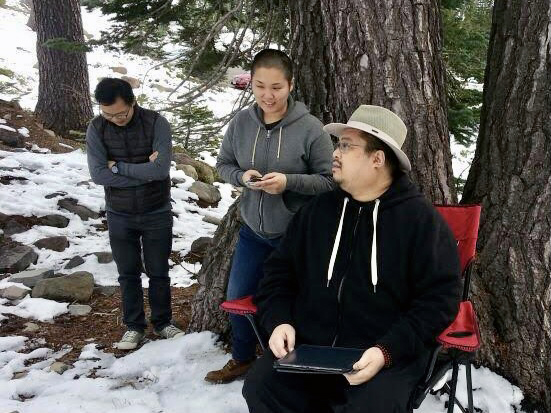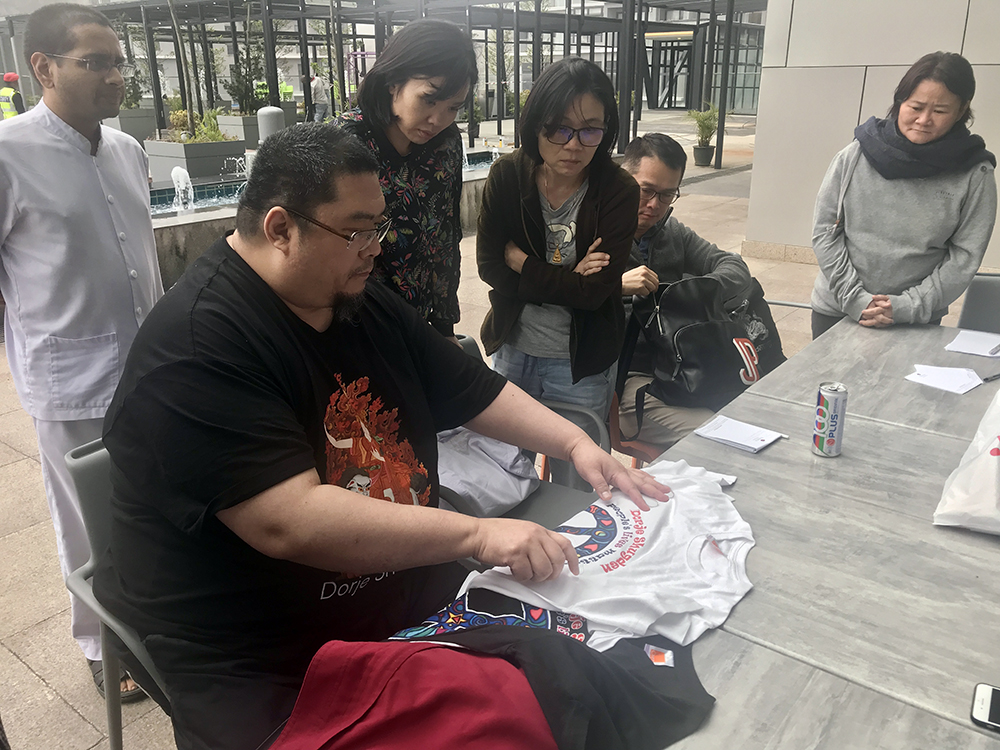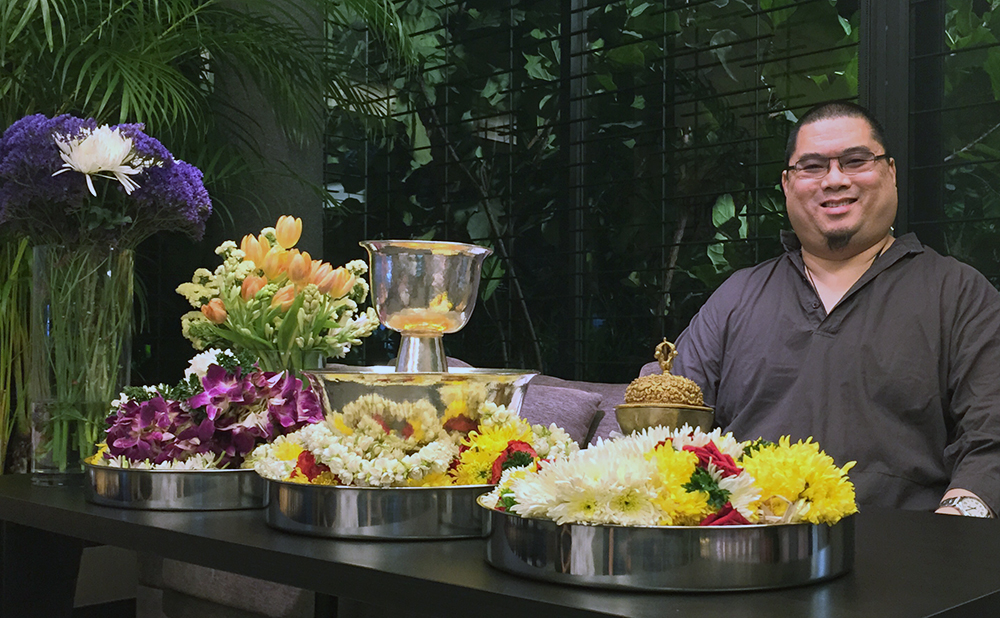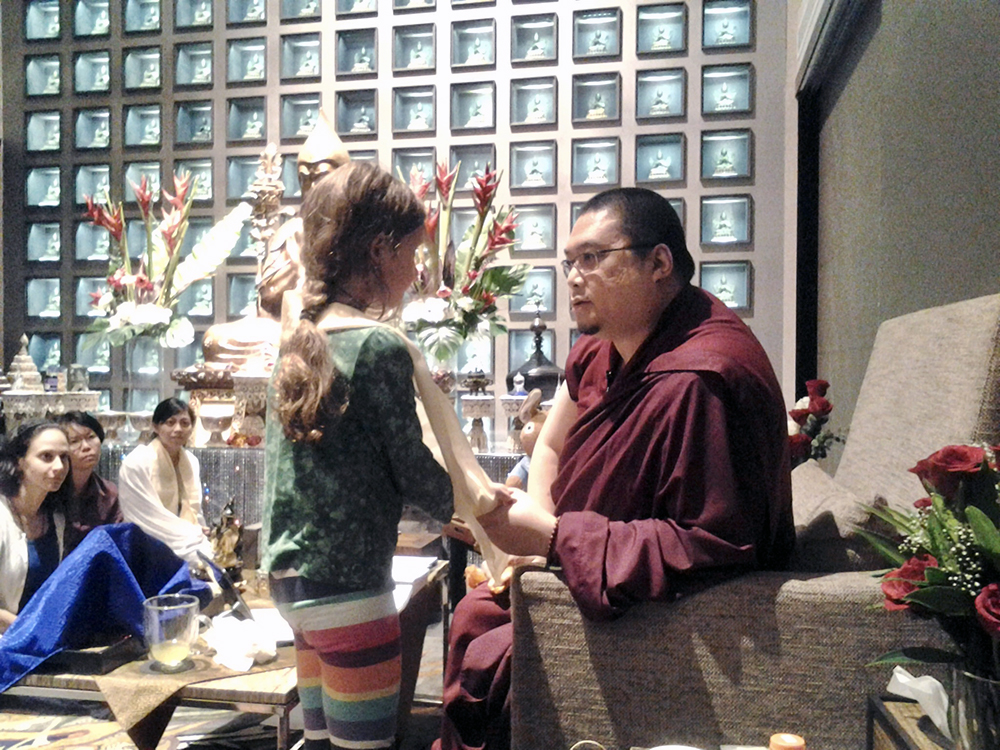Taking (spiritual) pain away
September 24, 2021 1
Rinpoche’s life was about taking pain away from people, on the level that worked best for them. This meant that oftentimes, Rinpoche went above and beyond to help others, whether it was physically, emotionally or spiritually. This time, I’m covering the spiritual aspect.

Somewhere on Mt Shasta with Rinpoche. Rinpoche had asked for an update about something I was working on, and asked me where I thought it was going or what kind of result it might lead to.
Over the years, due to Rinpoche’s close connection with Dorje Shugden, I was fortunate enough to be present on the many occasions Dorje Shugden gave advice and instructions to Rinpoche and the students. Usually, the role of scribe would fall to me, to record in writing whatever Dorje Shugden said so that it could be revisited and carried out later.
It was not a role to be taken lightly, not just because I did not want to get scolded for making a mistake! (OK fine, maybe there was a little bit of that!) It was because the advice always concerned Kechara and the students’ spirituality. Thus everything had to be verbatim, recorded exactly as Dorje Shugden said it, and Rinpoche would check and recheck the advice with me to make sure everything was clear, everything made sense and nothing was omitted.
On one particular occasion, I was the only person present with Rinpoche when Dorje Shugden gave advice. Dorje Shugden compassionately remained for about 30 minutes and after that, as usual, I recapped for Rinpoche what had been said to me. Part of it was:
“Take problems and criticism from others and give back kindness. That’s what a real spiritual practitioner does – takes problems and criticism from others and gives back kindness over and over again. I wouldn’t be able to tell you this if you weren’t extremely smart. You have penetrative analysis bordering wisdom. You can think philosophically but also practically. Over time this will develop. If I told this to anyone else, they would run away. Develop bodhicitta and renunciation. Realisation of emptiness is a requirement but in this case we can make an exception. Develop extraordinary guru devotion. You have this in you. Do all the things everyone else doesn’t want to do.”
Rinpoche asked me to stop and thought about it for a moment. Then Rinpoche asked, “Develop bodhicitta and renunciation? Are you sure Dorje Shugden said that? Repeat to me again what he said.”
So I did, two more times in fact, before Rinpoche was satisfied with what he heard. Rinpoche then said, “Hmmm. What do you think that means?”
Embarrassed, I very hesitatingly replied, “I guess it means I don’t have it. Or I’m lacking in those qualities so I need to work on that the most.”
Rinpoche immediately stopped me and looked almost annoyed. Rinpoche said, “Why do you think like that? It doesn’t mean that at all. It means Dorje Shugden believes you can do it. If not he wouldn’t tell you. What’s the point of telling you to do something you’re not capable of doing? He doesn’t tell anyone else to do that. It means Dorje Shugden believes you can do it. Do you understand?” Then Rinpoche had me continue reading out the rest of the advice.
It was not just during these occasions when Rinpoche would ask us for our thoughts and opinions. It would happen all the time, from something as significant as an issue related to Kechara, to something as mundane as where we should go for cham cham (Rinpoche’s word for an outing). It was to train us to think for ourselves, to care enough to thoroughly explore an issue and to take responsibility for our decisions; if we discussed extensively and decided on something, and then things went wrong, it would be up to us to rectify the situation.

Although oftentimes Rinpoche had already made a decision, Rinpoche always wanted to hear what everyone else thought. It was a way of gauging a student’s mind, as well as training us to take responsibility for our opinions and decisions, and to care enough to think about things thoroughly.
So after a few more incidents like this, where Rinpoche would ask for my thoughts on something, one day Rinpoche said to a group of people, “See, she always looks at things negatively. Her reaction is always to expect the worst. It must be because she grew up in an environment that made her very sensitive to negativity and anything she did wrong, she got criticised or punished or scolded. I know because my childhood was like that too. So to deal with PJA, you need to…”
That was the first time I had ever heard a direct connection drawn between the experiences of my childhood and the way I behave as an adult, and it was Rinpoche who provided that realisation for me.
And that was typical Rinpoche, always using his own experiences to heal people, and to change their view and wrong perception. For example, because Rinpoche had experienced an abusive childhood, Rinpoche knew the importance of showing love to children and setting a good example for them. Because Rinpoche had experienced homelessness as a teenager, Rinpoche knew what life on the streets is like with no sense of security or dignity, so Rinpoche established Kechara Soup Kitchen.
So as I was researching and preparing for this post, thinking about all the different ways Rinpoche has healed us spiritually, I went through a lot of the advice we had all previously received from Rinpoche and Dorje Shugden. And one thing struck me very deeply, that this was yet another way Rinpoche had been preparing us for a time when his physical form would be temporarily absent.
You see, at the time we received the advice, we naively assumed it was pertinent to that moment or time period only. But on reflection, the advice is now more relevant than ever. Oftentimes, it addresses whatever emotions and experiences we would have once Rinpoche was no longer physically with us.
When the lama’s physical form is no longer here, what else can you hold on to other than memories? The most useful, beneficial thing for us to do, to repay our teacher’s kindness, is to hold on to the advice and teachings he has given us.
Certainly, for myself, when I look at the advice Rinpoche and Dorje Shugden gave me, I find a lot of comfort in the words. It is a kind of comfort that no one else can give me and I came to realise that Rinpoche, from many years ago, was already giving us guidance on how to heal and care for ourselves spiritually in the temporary absence of his physical form.
All of this leaves me in awe of the limitless, expansive, enlightened mind that Rinpoche possessed, the type of mind that could perform a deed which simultaneously covered the past, present and future. In giving us advice, Rinpoche helped us understand where our issues arose from that such advice would be needed (past); in giving us advice, Rinpoche gave us a way to tackle those issues (present); in giving us advice, Rinpoche prepared us to be alright and taken care of in his physical absence (future).
To my Lama, who is one with Heruka, we look forward to welcoming you home soon.
One Comment → “Taking (spiritual) pain away”
Leave a Reply Cancel reply
Recent Posts
Subscribe to Blog
Categories
Archives
Visitors by Country
| Total Pageviews: | 1 |
|---|





Thank you for making this blog post